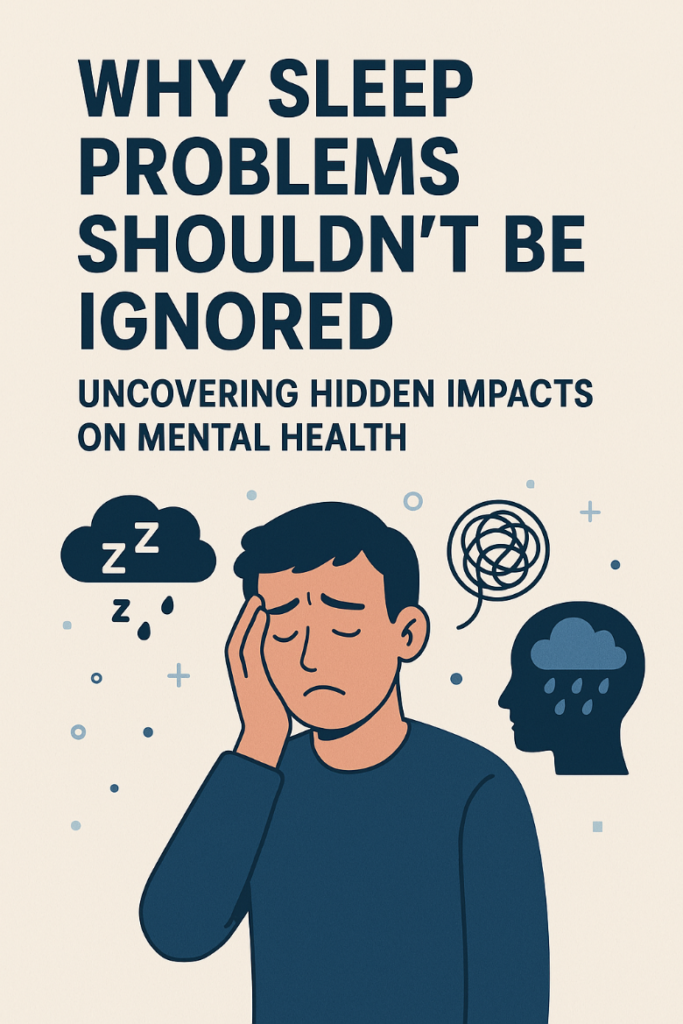Sleep is essential for our overall health, yet many people struggle with sleep problems. As a mental health expert working with government agencies, I want to emphasize that sleep disturbances are not just a minor inconvenience—they can have a serious impact on our mood, cognition, and overall well-being. In this article, we will explore how poor sleep affects our mental health, what hidden impacts it may have, and what can be done to address these issues.
The Importance of a Good Night’s Sleep
Sleep is a vital process that helps our bodies repair and rejuvenate. It is during sleep that our brain processes information, forms memories, and resets our emotional state. When we get enough rest, our mood stabilizes, our concentration improves, and we are better equipped to handle daily challenges. However, when sleep problems occur, the consequences can reach far beyond mere tiredness.
Sleep and Its Role in Mental Health
Sleep problems such as insomnia, sleep apnea, and restless sleep can lead to:
- Mood Changes: Lack of sleep is closely linked to irritability, anxiety, and depression.
- Cognitive Impairments: Poor sleep can affect attention, memory, and decision-making skills.
- Physical Health Issues: Chronic sleep disturbances are associated with higher risks of cardiovascular diseases, obesity, and weakened immune systems.
Government studies and research have consistently shown that untreated sleep problems can lead to a decline in mental health. Recognizing and addressing these issues early can prevent more serious conditions from developing.
How Sleep Disturbances Affect Mood
Mood is one of the first areas impacted by sleep disturbances. When you do not sleep well, you may notice that you feel more irritable, anxious, or even sad. Here are some key points on how sleep problems affect mood:
Increased Irritability and Stress
When you are sleep-deprived, the brain struggles to regulate emotions effectively. This leads to heightened stress responses and makes you more susceptible to everyday irritations. Research indicates that sleep-deprived individuals may experience up to a 60% increase in irritability compared to those who sleep well.
Risk of Depression and Anxiety
Long-term sleep problems are linked to the development of mood disorders such as depression and anxiety. The brain’s ability to manage stress hormones is compromised when it does not get sufficient rest. Over time, this imbalance can lead to significant mood disorders. In fact, studies suggest that people with chronic insomnia are twice as likely to experience depression.
Emotional Regulation
Adequate sleep is crucial for emotional regulation. When sleep is disrupted, the amygdala—the part of the brain responsible for emotional responses—becomes overactive. This results in an exaggerated response to stress and negative emotions. Consequently, even minor setbacks can trigger a strong emotional reaction.
The Cognitive Consequences of Poor Sleep
Concentration and memory are essential for daily functioning, and they are among the first cognitive areas affected by sleep problems. Here’s how sleep disturbances impact our mental processes:
Impaired Concentration and Attention
When you don’t get enough sleep, your brain’s ability to focus diminishes. This can make even simple tasks seem challenging. Many people with sleep disturbances report feeling “foggy” or unable to concentrate on work or school. Reduced concentration not only affects productivity but can also increase the risk of accidents, especially in tasks that require alertness, such as driving.
Memory Problems
Sleep plays a crucial role in memory consolidation. During sleep, particularly during the deep stages, the brain organizes and stores the information you have gathered throughout the day. Without sufficient sleep, this process is interrupted, leading to difficulties in forming new memories and recalling information.
Also Read: Helping Teens Cope: How Counselling Eases Stress and Anxiety
Decision-Making Difficulties
Sleep deprivation also affects executive functions such as decision-making and problem-solving. When your brain is tired, you may find it harder to weigh options, make judgments, or respond quickly to changing circumstances. This can affect not only personal decisions but also professional and social interactions.
Overall Well-Being and Physical Health
The impacts of sleep problems extend beyond mood and cognition. Poor sleep can have a domino effect on overall well-being, leading to various physical health issues that further exacerbate mental health challenges.
Physical Health Consequences
Chronic sleep deprivation is associated with numerous health problems, including:
- Cardiovascular Issues: Inadequate sleep increases the risk of high blood pressure, heart attacks, and stroke.
- Weakened Immune System: Lack of sleep can compromise your immune system, making you more susceptible to infections.
- Metabolic Disorders: Poor sleep patterns are linked to an increased risk of obesity and type 2 diabetes.
These physical health issues can, in turn, impact mental health. For example, chronic pain from physical conditions can lead to increased stress and depression, creating a vicious cycle that further disrupts sleep.
Impact on Daily Functioning
When sleep problems persist, they can interfere with your ability to perform everyday tasks. The resulting fatigue can make it difficult to manage responsibilities at work, school, or home. This loss of functionality can lead to feelings of frustration, decreased self-esteem, and a sense of helplessness, all of which contribute to deteriorating mental health.
Uncovering the Hidden Impacts
Many people underestimate the long-term consequences of sleep problems. However, the hidden impacts on mental health are profound and far-reaching. Some of these include:
Increased Vulnerability to Stress
Without sufficient sleep, the body’s ability to handle stress diminishes. This means that even small stressors can feel overwhelming, leading to an overactive stress response. Over time, this heightened sensitivity to stress can make it increasingly difficult to manage daily pressures.
Social and Relationship Challenges
Sleep problems can also affect your social interactions. When you are sleep-deprived, you may become more withdrawn or irritable, which can strain relationships with family, friends, and colleagues. Effective communication and empathy become harder to maintain, potentially leading to isolation and loneliness.
Long-Term Mental Health Risks
The cumulative effect of chronic sleep disturbances is a higher risk of developing serious mental health disorders. Long-term research has linked sleep problems with a greater likelihood of developing conditions such as anxiety disorders, depression, and even bipolar disorder. It is crucial to view sleep problems as an early warning sign rather than a temporary inconvenience.
Strategies to Improve Sleep and Mental Health
Addressing sleep problems is key to protecting and improving mental health. Here are some practical strategies recommended by mental health experts and government agencies:
Establish a Consistent Sleep Schedule
Going to bed and waking up at the same time every day can help regulate your body’s internal clock. Consistency is vital for maintaining healthy sleep patterns.
Create a Sleep-Friendly Environment
Ensure that your sleeping environment is comfortable, quiet, and dark. Consider using blackout curtains, white noise machines, or earplugs if needed. A comfortable mattress and pillow can also make a significant difference.
Limit Screen Time Before Bed
The blue light emitted by screens on phones, tablets, and computers can interfere with the production of melatonin, a hormone that regulates sleep. Try to avoid screens at least one hour before bedtime.
Practice Relaxation Techniques
Incorporate relaxation techniques into your bedtime routine. Activities such as deep breathing, meditation, or gentle stretching can help calm the mind and signal to your body that it’s time to sleep.
Seek Professional Help
If sleep problems persist despite these efforts, it is important to consult a healthcare professional. Sleep disorders, such as insomnia or sleep apnea, may require professional diagnosis and treatment. Early intervention can prevent the development of more serious mental health issues.
The Government’s Role in Promoting Healthy Sleep
Recognizing the critical link between sleep and mental health, government health agencies are increasingly focused on public awareness campaigns. These initiatives aim to educate the public about the importance of good sleep hygiene and provide resources for those struggling with sleep problems. By fostering community programs and supporting research into sleep disorders, governments are taking proactive steps to improve the overall well-being of their citizens.
Public Awareness and Education
Educational campaigns on sleep health help dispel myths and provide accurate information about the importance of sleep. Government websites, community health centers, and public service announcements play a key role in reaching a broad audience and offering practical advice.
Support for Research
Government funding for sleep research has increased in recent years. This research is vital for understanding the underlying causes of sleep disturbances and developing effective treatment strategies. Continued investment in this area is crucial for enhancing public health outcomes.
Workplace Initiatives
Recognizing that many adults struggle with sleep due to job-related stress, some government initiatives focus on improving workplace environments. Programs that encourage flexible work hours, stress management training, and wellness initiatives can contribute to better sleep and, consequently, better mental health.
FAQs
Q1: How many hours of sleep are recommended for adults?
A1: Most adults should aim for 7 to 9 hours of sleep per night to support optimal mental and physical health.
Q2: What are the common signs that sleep problems are affecting my mental health?
A2: Common signs include increased irritability, difficulty concentrating, memory issues, and feelings of anxiety or depression.
Q3: Can improving my sleep really make a difference in my mood and cognitive function?
A3: Yes, better sleep can lead to improved mood regulation, sharper cognitive function, and reduced stress levels.
Q4: What simple steps can I take to create a better sleep environment?
A4: Consider establishing a consistent sleep schedule, reducing screen time before bed, using blackout curtains, and practicing relaxation techniques.
Q5: When should I seek professional help for sleep problems?
A5: If sleep issues persist for more than a few weeks or begin to significantly interfere with your daily life, consult a healthcare professional.
Final Thoughts
Sleep problems are much more than an inconvenience. They are a signal from your body that something is amiss. As we have discussed, sleep disturbances have significant hidden impacts on mental health, affecting mood, cognition, and overall well-being. By understanding these effects and taking proactive steps—such as maintaining a consistent sleep schedule, creating a sleep-friendly environment, and seeking professional support when necessary—you can protect your mental health and improve your quality of life.
It is important to remember that sleep is not a luxury but a necessity. Recognizing the signs of sleep disturbances early on can help prevent the development of more serious mental health conditions. The collective efforts of individuals, communities, and government agencies are essential in promoting healthy sleep habits and ensuring that everyone has the opportunity to live a balanced, fulfilling life.
As we continue to prioritize sleep health, we contribute not only to individual well-being but also to a healthier society overall. Good sleep is a cornerstone of mental health, and by paying attention to our sleep patterns, we are taking an important step toward a better future. Remember, every good night’s sleep is an investment in your health—one that pays dividends in improved mood, sharper thinking, and a more resilient mind.
Also Read: Breaking the Cycle: Strategies to Overcome Concentration Challenges and Overthinking


